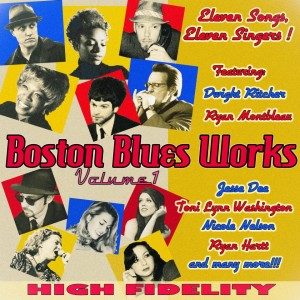 Boston Blues Works Volume 1 features some of the local blues scenes most exciting singers and players. There isn’t a lot of information available about why this band of local notables began this project. Their website is still under construction. Yet, the assemblage of talent has resulted in an above average album of 11 songs.
Boston Blues Works Volume 1 features some of the local blues scenes most exciting singers and players. There isn’t a lot of information available about why this band of local notables began this project. Their website is still under construction. Yet, the assemblage of talent has resulted in an above average album of 11 songs.
Vocalist Ryan Hartt opens this disc with “No Blow, No Show, a song written by Bobby Bland with an old fashioned radio sound. Hartt sounds like he’s playing on an old mono stereo. His smooth tenor just glides across this surface like ice skaters. Warm and inviting, his vocal lulls you gently into his space. From there, you’re treated to the Boston Blues Work Band, an assembly of the Hub’s finest players. The band plays a two step shuffle with an edgy guitar in a mid tempo pace that keeps the groove afloat. Hartt’s harmonica works up an inspired locomotive sound.
Jamie Lynn Hart takes the listener into “Coming Home” by Elmore James. Hart sounds as raspy as ever in this down and dirty take on the Chicago/Mississippi Delta blues, giving a flawless interpretation of the modern day blues chanteuse, even though she usually plays out and records as a pop rocker. The band offers up a thick, tasty sandwich of instrumentation. Guitars are feisty, bracing each other in a witty musical repartee. One presses out the Mississippi Delta with thick richness. Piano tinkling shines and harmonica blows another pushy, sweet melody line. The rhythm section boys put a healthy thump underneath it all.
Ryan Montbleau goes into “Sho Nuff” I Do” also by Elmore James, putting heart and soul into it. Singing in a plaintive crawling appeal, Montbleau needs to talk to his lady love right away. Mike Abelson harmonica is a greasy robust filling of melodic joy, moving around like a hip cat in a trench coat mystery groove. Jason Cohen’s piano and organ whip up a heaping of hot gravy to pour over a solid, anchored beat. And check out the stinging guitar line from Milt Reder. It has that true blues bite born of precision and tone.
With his easeful, lilting voice, Jesse Dee takes the listener into “Spasms” by Otis Blackwell and Henry Glover. Dee sings this one as if he is having actual spasms. His voice springs out like a coiled snake, hitting the musical mark while remaining fun entertainment. Blackwell wrote hits for Elvis Presley in the 1950s, and likewise this ditty is marked by accessible instrumentation. Guitarist Milt Reder does some spiky runs while pianist David Maxwell adds some classy quick notes and the groove from rhythm boys Dean Cassell(bass) and Dwight Ritcher(drums) is head bopping irresistible.
“That’s All Right” by Jimmy Rogers gets the vintage old time blues chanteuse vocal treatment from Gracie Curran. She utilizes her usual technique to full effect, bringing out a sound from yesteryear, and it holds up well here. Bright, shiny, the voice sets the mood for an eloquent bass line and cool piano tinkling. A guitar melody from Milt Reder gives the nimblest push but its the muscle in Matt Giannaros bass line that will move you the most here.
Racky Thomas has no trouble rocking right out on familiar territory. His original “Rock Lil Baby” gets the full entertainment service from his festive vocal style. As usual, Thomas sets a party mood with his front man excesses. The song feels more like an oldies rock and roll send up, yet Thomas has a way of making everything blues with his gravelly voice. It certainly doesn’t hurt to have along for the convertible ride Cassell, Reder, Jason Cohen, Matt Giannares ad Dwight Ritcher. The boys keep it accessible, fun, and musically meaningful.
“Ain’t Nobody’s Business” by Porter Grainger finds singer Dwight Ritcher’s booming voice erupting in a soulful expression of personal freedom. He just lets the words and the feelings pour right out of him, filling up the song with much artistic vocal flourishes. There is nothing like a singer who can paint a picture with subtle touches of tone, timbre stretching, sustaining. Ritcher just wrings out so much feeling, expressing lots with minor shifts in his voice. Milt Reder gets tasteful in his sharp phrasing and Mary Rowen lays out some smoky swirls. Dean Cassell and Lorne Entress put an authoritative groove into it.
Rebecca Muir gives us some on Willie Dixon’s “I Just Wanna Make Love To You.” Muir’s svelte voice rides this funked up version like a Harley, revving up on those high notes. She purrs like a kitten before shifting into first gear with sustains at once mighty and sweet. Marty Rowen’s organ chords stab into the groove to add another smoky allure. Bass man Dean Cassell keeps it throbbing with his low end punches and drummer Ritcher drives it in mercifully.
Toni Lynn Washington goes into Tracy Chapman’s “Give Me One Reason.” Her smoky, heartfelt vocal lift milks all of the tempered energy of a down tempo blues structured rendition. As always, it’s a joy to hear Ms. Washington breathe new life into a familiar song with her earthy alto. Mike Abelson’s brisk harp notes makes the song arc, and David Maxwell’s strikingly spiky piano notes tinkle their own personal magic. Sean Cronin tosses in an understated guitar line, completing things within his edgy framework.
“Cheryl Aruda” gives up some “Good Lovin’ on the oldie originally written for The Young Rascals by Rudy Clark and Arthur Resnick. As usual, Aruda is powerful and strikingly emotive on this blues version of the 1966 hit, giving it a bold sexuality that was missing back then. Dean Cassell’s throbbing bass line may remind listeners of good loving with its passionate, irresistible tumescence.
“Oh What A Dream,” written in 1954 by Chuck Willis for Ruth Brown, receives a beautifully silky treatment from the fine Nicole Nelson. Wringing every feeling out of this song with earth shattering sustains, Nelson makes her verses erupt with passion. Flowing, dreamy organ chords from Marty Rowen and breezy guitar chords from Dwight Ritcher set the mood beneath that natural, fine-tuned instrument, her voice.
Boston Blues Works Volume 1 works to keep music fans informed about the various offerings of talented blues men and blue women in the Hub. The entire recording played out like the neatly arranged project it is. Much energy and passion here despite the likely momentum disruptions from holding separate sessions for each vocalist. Yet, individual moments are very satisfying and the disc certainly documents why Boston is one of America’s finest cities for the blues.

